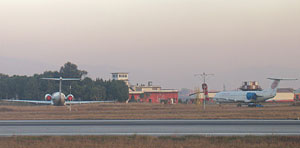|
|
He wanted to know if they were linked to the large advertisements appearing in local newspapers. Sure enough, two of the planes sitting on the tarmac missing engines and wing parts were Fokker100s. In any case, Cosmic's debacle is just the latest airline scandal that has meant one step forwards and two steps back for the airline industry. How can one request the government to please hand over airport management to the private sector when the majority of private airlines have stalled?
Non-payment of lease rentals, dues amounts to billions to the Nepal Oil Corporation, and to CAAN. The only blame that perhaps can be pinned on the authorities is that they were not diligent in awarding licenses. How else to explain private promoters of airlines that have folded to emerge again and again in new avatars?
In previous columns, this Beed delved into the opportunity for the private sector to lead when the political quagmire is stalling all other economic and development processes. Instead, it appears the private sector has seen the political situation more as an opportunity to move closer to power centres and not to their consumers. Yet what better opportunity could business have had than a government whose cabinet itself includes private sector stalwarts?
In Nepal, the private sector is more synonymous with the sahus who even the most remote villagers can identify. The image is of an exploitative, rent-seeking community that sucks profits out of the poor. The conversion of many of these erstwhile sahus into corporate houses has only modernised them, not changed their modus operandi.
The average citizen sees the private sector not paying loans on time, not abiding by the rules of law, using bureaucrats and politicians to further personal goals, not being just to workers, shying away from appointing professional managers, evading taxes, playing politics in their associations and being translucent instead of transparent. Is anyone interested in shedding this image?
The class war that began in a small part of the country has engulfed the entire nation. The frustrati and anger of rural Nepalis at the business and political elite concentrated in urban centres has led to violence that has consumed the lives of so many people. The private sector must also take a part of the blame. In many countries ridden by conflict and political turmoil, the private sector has emerged as the change agent, creating more jobs and services and taking calculated risks with the larger objective of doing good for society rather than only bloating the bottom lines of their income statements.
The objective here is not to blame a particular business, group of firms or business associations. It is rather to persuade people in the private sector to consider their conduct in the larger context of the nation. We need peace restored, not just because the conflict has shattered lives but also because it will be the private sector that will ultimately benefit from peace. Business should not exploit this war but start working to stop it.




